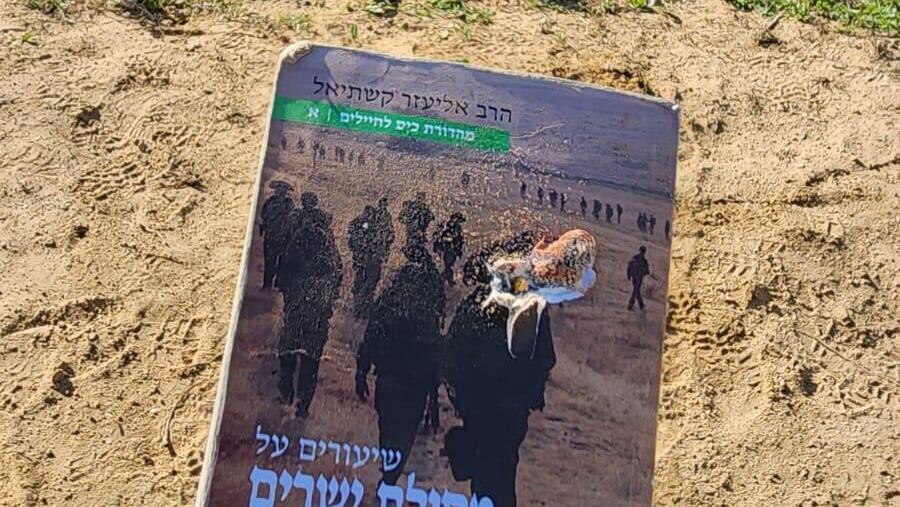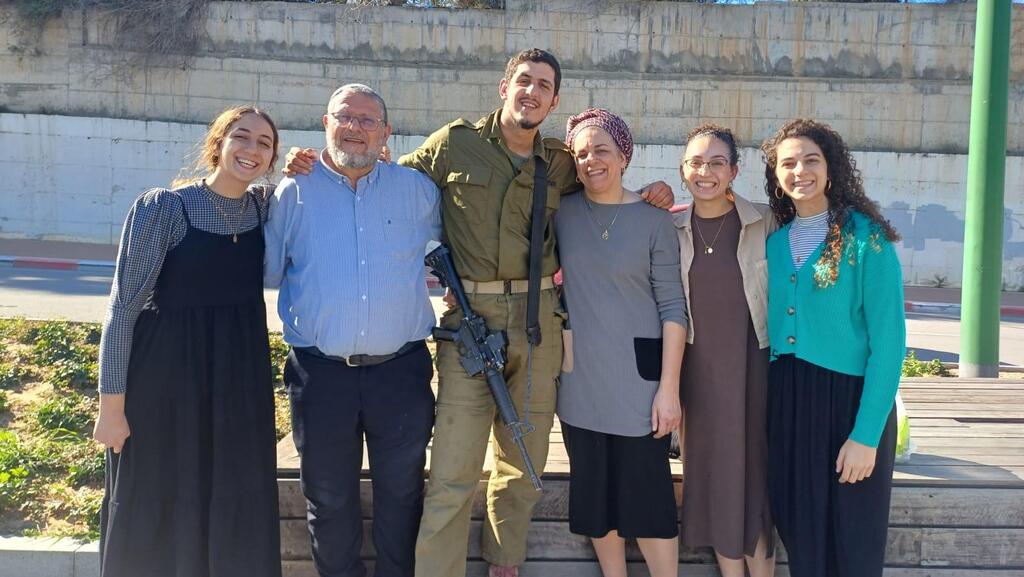Corporal Abraham Moshkovitz, 20, was injured during the fighting in Khan Younis. Two days after beginning his rehabilitation at the Tel Aviv Sourasky Medical Center, he discovered that a book he carried in his pocket absorbed much of the shrapnel that could have seriously injured his knee, preventing a much worse injury.
It was a pocket edition of a Jewish book "Lessons on the Path of the Upright" by Rabbi Eliezer Kashtiel, a contemporary commentary on the famous Jewish ethical work by Rabbi Moshe Haim Luzzatto. "I am thankful to God because I am near the end of my recovery. The main issue was my hand, where there was nerve damage. My condition has really improved," Moshkovitz tells Ynet.
"I received a picture from the battalion's rabbi. He showed me a large piece of shrapnel and several smaller ones that hit the book," he recalls. "They told me that the shrapnel that penetrated my leg was quite superficial. I believe the book prevented deep penetration of the larger piece of shrapnel, which could have ended this story completely differently – both in terms of blood loss and nerve damage."
What prompted you to bring this particular book to the battlefield?
"Before my enlistment, I didn't study much of 'Mesilat Yesharim' (Path of the Upright). I'm more of a Talmud guy. But at some point in the army, I felt I needed something deeper, something for the soul. I saw people reading this book, with Rabbi Kashtiel's commentary, in a pocket edition specifically designed for soldiers. It's amazing. I believe every religious soldier, and every soldier in general can learn a lot from it. You can read a passage and then contemplate it for an hour."
Did it give you strength?
"When you're in the Gaza Strip, it's tough. Weeks without a shower, without a phone, constantly in danger, and sometimes you ask yourself why you're doing this at all. Whenever I had time, I studied the book, and when you read it, you learn that not everything is about your personal ego, and there's a much greater meaning than momentary life. Many soldiers related to this. For example, it's written in the book about the relationship between this world and the world to come – that this world is preparation for the next world, in a sense. When you look at your life now as part of it all, you're much less afraid. When you understand that even if God forbid something happens to you, it doesn't end here, especially when you did it for other people and for the nation, you understand that you did the right thing. The thought that you have the world to come diminishes that fear, that concern. It gives a lot of strength."
Moshkovitz wants to go back to fighting
"Our battalion's goal was to seize routes, advance in neighborhoods, and neutralize terrorists. We had a mission in the eastern part of the Gaza Strip, then we were in Shijaiyah, and then in Khan Younis. We fought alongside Givati troops, and at one point, we relieved them."
"One time, we entered a sort of courtyard surrounded by a wall. Terrorists were waiting for us from two different directions. The first platoon captured the central house there; we were waiting for the second platoon. I remember I was right next to the platoon leader, and suddenly we heard something fall. The platoon leader realized it was a grenade and shouted. There was an explosion. We started firing; they started firing at us and threw another grenade. I think there were three grenades. My friend got shrapnel in his head."
He continues: "I was behind a wall, not where the initial encounter happened. Suddenly another grenade fell right next to me. I stood up and shouted 'grenade,' turned around, took a step and a half, and there was an explosion. I fell to the floor. I tried to get up and saw I had a lot of blood on my leg. They hit my shoulder, and because of the water in the canteen, it looked like I lost a lot of blood. I'm a big guy, two meters tall and weighing quite a bit. Eventually, they took me to a stretcher and put tourniquets on my arm and leg. I realized I also had shrapnel in my knee. They patched us up and airlifted us. We flew to the hospital and received medical treatment."
According to him, in hindsight, "the whole situation there was a big miracle. I was sure the event would be much harder. There was an amazing performance by the commanders and the rescue team. Five of the terrorists who attacked us were killed, and we came out of the encounter with only two lightly wounded."
"Most of my injury is in my fingers, with some shrapnel wounds. As long as the doctors don't give a hundred percent clearance, the army can't take risks. I hope to return soon. My friends are fighting, and I need to be with them."




